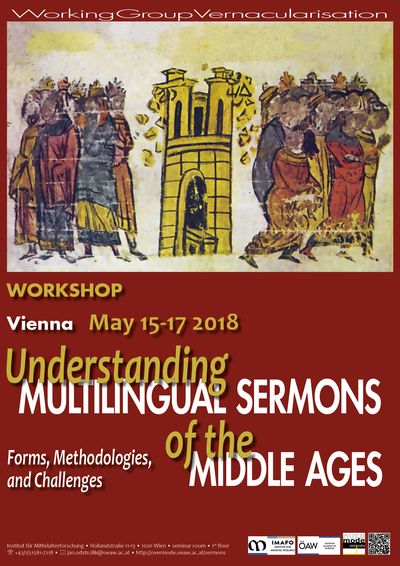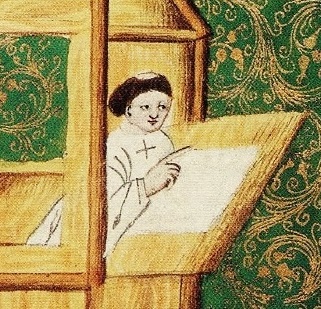Understanding Multilingual Sermons of the Middle Ages
Forms, Methodologies, and Challenges
May 15-17, 2018, Vienna, Hollandstraße 11-13, 1020 Vienna
Organised by: Jan Odstrcilik
Hosted by: Institute for Medieval Research, Austrian Academy of Sciences

Macaronic sermons, or generally multilingual sermons, in the Middle Ages are a fascinating and intriguing phenomenon. Many monographs and articles written by numerous researchers in the last decades, like Siegfried Wenzel, Nicole Bériou, Carmen Kämmerer, Herbert Schendl, and many others, have shown the immense variety in the forms of multilingual sermons and possibilities of their interpretation.
Multilingual sermons are common in almost every part of Europe, although many of them are still waiting for the appropriate research attention. Related methodologies are still unsettled, as well as opinions regarding their origin, purpose, and relation to possible performance. However, be they reportationes, artificial creations of preachers, or translations, be they written for preachers, or readers, they all represent the complex language situation of the European High and Late Middle Ages.
The idea for this workshop originated from two sessions held at different conferences in 2017: Latinity in Multilingual Environment at the The XI Cardiff Conference on the Theory and Practice of Translation in the Middle Ages in Vienna and Medieval Sermons between Latin and Vernaculars: Translations, Reportationes, and Multilingualism at International Medieval Congress 2017 in Leeds. The workshop has two aims:
- Firstly to bring together researchers working on this topic from different countries, and of different backgrounds and approaches. Because of the nature of these sermons, which is often Latin-vernacular, they remain studied within the borders of respective national philologies in many instances.
- Secondly to discuss different approaches and methodologies to the material, including but not limited to modern theories of code-switching, corpus linguistics, sociolinguistics, translatology etc.
These two aims will be reflected also in the programme of the workshop. In addition to presentations of papers, one or two lectures will be held on the topics of modern linguistic approaches, such as corpus linguistics or modern code-switching theories.
All papers should be in English and should discuss multilingual sermons. However, the material and approaches of various papers can be vastly different. Sermons can be fully or partially macaronic, as well as glossed, or even exceptionally only written in one language if another language is still heavily present in the text on a syntactical or lexical level.
Texts of other genres can be also treated, if they are related directly to the multilingual medieval sermons (e.g., artes praedicandi), or if the usage of languages found in them resembles the situation in multilingual sermons (e.g., similar forms of code-switching).
We welcome also papers presenting still on-going research.
Please note that the workshop will be fee-free and without reimbursements.
